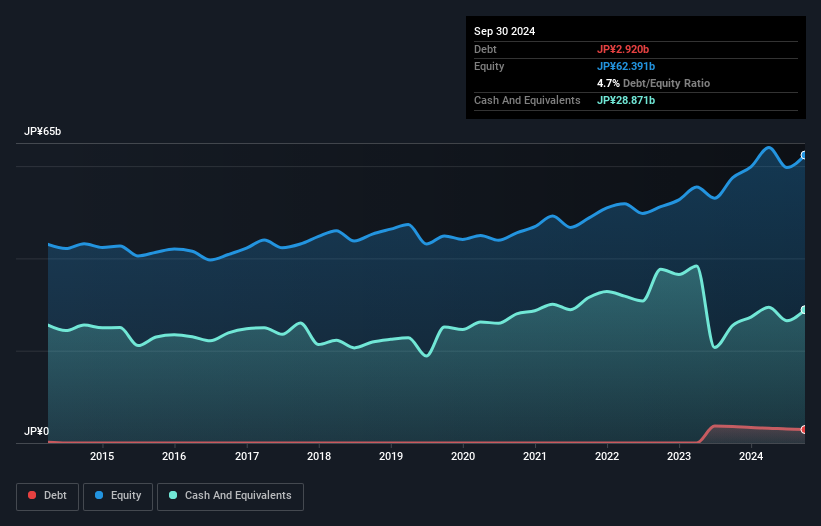The external fund manager backed by Berkshire Hathaway's Charlie Munger, Li Lu, makes no bones about it when he says 'The biggest investment risk is not the volatility of prices, but whether you will suffer a permanent loss of capital.' So it seems the smart money knows that debt - which is usually involved in bankruptcies - is a very important factor, when you assess how risky a company is. As with many other companies NSD Co., Ltd. (TSE:9759) makes use of debt. But is this debt a concern to shareholders?
Why Does Debt Bring Risk?
Generally speaking, debt only becomes a real problem when a company can't easily pay it off, either by raising capital or with its own cash flow. Ultimately, if the company can't fulfill its legal obligations to repay debt, shareholders could walk away with nothing. However, a more common (but still painful) scenario is that it has to raise new equity capital at a low price, thus permanently diluting shareholders. Of course, the upside of debt is that it often represents cheap capital, especially when it replaces dilution in a company with the ability to reinvest at high rates of return. When we think about a company's use of debt, we first look at cash and debt together.
View our latest analysis for NSD
How Much Debt Does NSD Carry?
You can click the graphic below for the historical numbers, but it shows that NSD had JP¥2.92b of debt in September 2024, down from JP¥3.57b, one year before. However, it does have JP¥28.9b in cash offsetting this, leading to net cash of JP¥26.0b.

A Look At NSD's Liabilities
The latest balance sheet data shows that NSD had liabilities of JP¥15.0b due within a year, and liabilities of JP¥7.52b falling due after that. Offsetting these obligations, it had cash of JP¥28.9b as well as receivables valued at JP¥18.8b due within 12 months. So it actually has JP¥25.1b more liquid assets than total liabilities.
This short term liquidity is a sign that NSD could probably pay off its debt with ease, as its balance sheet is far from stretched. Simply put, the fact that NSD has more cash than debt is arguably a good indication that it can manage its debt safely.
Also good is that NSD grew its EBIT at 10% over the last year, further increasing its ability to manage debt. When analysing debt levels, the balance sheet is the obvious place to start. But it is future earnings, more than anything, that will determine NSD's ability to maintain a healthy balance sheet going forward. So if you're focused on the future you can check out this free report showing analyst profit forecasts.
Finally, a business needs free cash flow to pay off debt; accounting profits just don't cut it. NSD may have net cash on the balance sheet, but it is still interesting to look at how well the business converts its earnings before interest and tax (EBIT) to free cash flow, because that will influence both its need for, and its capacity to manage debt. During the last three years, NSD produced sturdy free cash flow equating to 75% of its EBIT, about what we'd expect. This cold hard cash means it can reduce its debt when it wants to.
Summing Up
While we empathize with investors who find debt concerning, you should keep in mind that NSD has net cash of JP¥26.0b, as well as more liquid assets than liabilities. And it impressed us with free cash flow of JP¥13b, being 75% of its EBIT. So we don't think NSD's use of debt is risky. Over time, share prices tend to follow earnings per share, so if you're interested in NSD, you may well want to click here to check an interactive graph of its earnings per share history.
When all is said and done, sometimes its easier to focus on companies that don't even need debt. Readers can access a list of growth stocks with zero net debt 100% free, right now.
Valuation is complex, but we're here to simplify it.
Discover if NSD might be undervalued or overvalued with our detailed analysis, featuring fair value estimates, potential risks, dividends, insider trades, and its financial condition.
Access Free AnalysisHave feedback on this article? Concerned about the content? Get in touch with us directly. Alternatively, email editorial-team (at) simplywallst.com.
This article by Simply Wall St is general in nature. We provide commentary based on historical data and analyst forecasts only using an unbiased methodology and our articles are not intended to be financial advice. It does not constitute a recommendation to buy or sell any stock, and does not take account of your objectives, or your financial situation. We aim to bring you long-term focused analysis driven by fundamental data. Note that our analysis may not factor in the latest price-sensitive company announcements or qualitative material. Simply Wall St has no position in any stocks mentioned.
About TSE:9759
Excellent balance sheet established dividend payer.
Market Insights
Community Narratives



